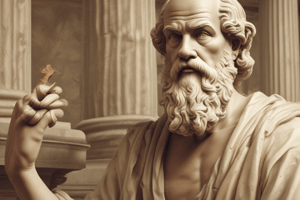Podcast
Questions and Answers
Who is considered to be the main source of Western Thought?
Who is considered to be the main source of Western Thought?
- Socrates (correct)
- Plato
- Aristotle
- Heraclitus
What is the main goal of the Socratic Method mentioned in the text?
What is the main goal of the Socratic Method mentioned in the text?
- To provide immediate answers
- To memorize facts
- To search for the correct definition through questioning (correct)
- To promote blind acceptance of ideas
Which ancient Greek philosopher believed that 'the unexamined life is not worth living'?
Which ancient Greek philosopher believed that 'the unexamined life is not worth living'?
- Socrates (correct)
- Aristotle
- Heraclitus
- Plato
According to Plato, what is the nature of Forms?
According to Plato, what is the nature of Forms?
In Plato's Theory of Forms, where does ultimate reality exist?
In Plato's Theory of Forms, where does ultimate reality exist?
Which philosopher believed in Dualism, proposing a distinction between the physical world and the world of Forms?
Which philosopher believed in Dualism, proposing a distinction between the physical world and the world of Forms?
What is the sin of greed associated with?
What is the sin of greed associated with?
Descartes' belief in 'Cogito ergo sum' emphasizes the importance of which aspect of human nature?
Descartes' belief in 'Cogito ergo sum' emphasizes the importance of which aspect of human nature?
In Descartes' system, what is the power that enables the apprehension of certain truths?
In Descartes' system, what is the power that enables the apprehension of certain truths?
What did John Locke believe was the source of knowledge according to the text?
What did John Locke believe was the source of knowledge according to the text?
Descartes' view on the Mind-Body Problem suggests that the soul/mind is separate from which entity?
Descartes' view on the Mind-Body Problem suggests that the soul/mind is separate from which entity?
What term does Freud use to refer to the mental elements in awareness at any given point in time?
What term does Freud use to refer to the mental elements in awareness at any given point in time?
What sin is associated with an excessive love for people, as per the text?
What sin is associated with an excessive love for people, as per the text?
Which part of the mind seeks pleasure according to Freud's theory?
Which part of the mind seeks pleasure according to Freud's theory?
What instinct is associated with the Eros component of the mind?
What instinct is associated with the Eros component of the mind?
According to Freud, what part of the mind is in contact with reality?
According to Freud, what part of the mind is in contact with reality?
Which level of mental life contains all the drives, urges, or instincts beyond our awareness?
Which level of mental life contains all the drives, urges, or instincts beyond our awareness?
Which of the following refers to psychological strategies used unconsciously to protect a person from anxiety?
Which of the following refers to psychological strategies used unconsciously to protect a person from anxiety?
Who contradicted Cartesian Dualism by stating that human consciousness and mind are very dependent on the human brain?
Who contradicted Cartesian Dualism by stating that human consciousness and mind are very dependent on the human brain?
What term did Gilbert Ryle use to refer to the erroneous belief that there is a 'Ghost in the Machine'?
What term did Gilbert Ryle use to refer to the erroneous belief that there is a 'Ghost in the Machine'?
Which defense mechanism involves attributing one's unacceptable thoughts or feelings to others?
Which defense mechanism involves attributing one's unacceptable thoughts or feelings to others?
What term do Patricia and Paul Churchland use to describe the combination of Neurology and Philosophy?
What term do Patricia and Paul Churchland use to describe the combination of Neurology and Philosophy?
What was invented to determine if an action deserves praise or blame?
What was invented to determine if an action deserves praise or blame?
What did David Hume conclude after reading John Locke's philosophy?
What did David Hume conclude after reading John Locke's philosophy?
According to Locke, where do morals, religious values, and political values originate from?
According to Locke, where do morals, religious values, and political values originate from?
In Immanuel Kant's view, how does the mind interact with the external world?
In Immanuel Kant's view, how does the mind interact with the external world?
What did Immanuel Kant argue about the mind's role in knowing objects?
What did Immanuel Kant argue about the mind's role in knowing objects?
According to Locke, where does morality come from?
According to Locke, where does morality come from?
What are the two types of perceptions according to David Hume?
What are the two types of perceptions according to David Hume?
Flashcards
Socratic Method
Socratic Method
A method of inquiry using a series of questions to find the correct definition of something.
Theory of Forms
Theory of Forms
Plato's idea that the physical world is not the real world; true reality exists beyond our senses.
Forms (Plato)
Forms (Plato)
Abstract, perfect, unchanging concepts that transcend time and space.
Cogito ergo sum
Cogito ergo sum
Signup and view all the flashcards
Mind-Body Problem
Mind-Body Problem
Signup and view all the flashcards
Tabula Rasa
Tabula Rasa
Signup and view all the flashcards
Levels of Mental Life (Freud)
Levels of Mental Life (Freud)
Signup and view all the flashcards
Provinces of the Mind (Freud)
Provinces of the Mind (Freud)
Signup and view all the flashcards
Defense Mechanisms
Defense Mechanisms
Signup and view all the flashcards
Knowing-that
Knowing-that
Signup and view all the flashcards
Knowing-how
Knowing-how
Signup and view all the flashcards
Neurophilosophy
Neurophilosophy
Signup and view all the flashcards
Impressions
Impressions
Signup and view all the flashcards
Ideas
Ideas
Signup and view all the flashcards
Empiricism
Empiricism
Signup and view all the flashcards
German Idealism
German Idealism
Signup and view all the flashcards
Western Thought
Western Thought
Signup and view all the flashcards
Philosophy
Philosophy
Signup and view all the flashcards
Socrates
Socrates
Signup and view all the flashcards
Plato
Plato
Signup and view all the flashcards
Rene Descartes
Rene Descartes
Signup and view all the flashcards
John Locke
John Locke
Signup and view all the flashcards
Sigmund Freud
Sigmund Freud
Signup and view all the flashcards
Gilbert Ryle
Gilbert Ryle
Signup and view all the flashcards
Immanuel Kant
Immanuel Kant
Signup and view all the flashcards
Study Notes
Philosophy of the Self
- Philosophy started in Athens, Ancient Greece around 600 BCE, meaning "love of wisdom" and encompassing understanding elements, mathematics, heavenly bodies, atoms, and man.
Socrates
- Socrates was an ancient Greek philosopher, scholar, and teacher who is considered the main source of Western Thought.
- He was not a writer, and his works were only known through Plato's writings (The Dialogues).
- Socratic Method: a method of inquiry consisting of a series of questions to search for the correct definition of a thing.
- Goal: to bring the person closer to the final understanding.
- Socrates' view of human nature: "the unexamined life is not worth living" and real understanding comes from within the person.
Plato
- Aristocles (428-348 BCE) founded The Academy.
- Wrote over 20 Dialogues, with Socrates as the protagonist in most of them.
- Theory of Forms: the physical world is not the real world; ultimate reality exists beyond our physical world.
- Forms: abstract, perfect, unchanging concepts or ideals that transcend time and space.
- Characteristics of Forms: ageless, unchanging, unmoving, and indivisible.
- Plato's Dualism: the sinfulness of man.
Rene Descartes
- "Father of Modern Philosophy" and a rationalist.
- Employed scientific method and mathematics in his philosophy.
- Cartesian Method and Analytic Geometry.
- Descartes' System: two powers of the human mind - Intuition and Deduction.
- View of human nature: Cogito ergo sum - "I think therefore I am."
- The cognitive aspect of human nature is his basis for the existence of the self.
- Mind-Body Problem: the soul/mind is a substance separate from the body.
John Locke
- Born in Wrington, England.
- Works focused on the workings of the human mind, particularly the acquisition of knowledge.
- Believed that knowledge results from ideas produced a posteriori or by objects that were experienced.
- Tabula Rasa: the mind is a blank slate.
Sigmund Freud
- Austrian neurologist and founder of psychoanalysis.
- Levels of Mental Life: Unconscious, Preconscious, and Conscious.
- Provinces of the Mind: Id, Eros, Thanatos, Ego, and Superego.
- View of human nature: an individual is a product of his past, and we live our lives by balancing the forces of life and death.
- Defense Mechanisms: psychological strategies that are unconsciously used to protect a person from anxiety.
Gilbert Ryle
- English philosopher who contradicted Cartesian Dualism.
- View of human nature: man is endowed with freewill, and it was invented to determine if an action deserves praise or blame.
- Two types of knowledge: Knowing-that and Knowing-how.
Patricia and Paul Churchland
- Canadian philosophers who combined neurology and philosophy (Neurophilosophy).
- Addressed the age-old problem of the mind-body relationship.
- Brain-mind relationship: "There isn't a special thing called the mind."
David Hume
- Born in Edinburgh, Scotland.
- Empiricism: after reading the philosophy of John Locke, he never again entertained any belief in religion.
- The Human Mind: receives materials from sense and calls it perceptions.
- Two types of perceptions: Impressions and Ideas.
- Principles of Association: Resemblance, Contiguity, and Cause-and-Effect.
Immanuel Kant
- Born in Konigsberg, East Prussia (Western Russia).
- Founder of German Idealism.
- Wrote three books: Critique of Pure Reason, Critique of Practical Reason, and Critique of Judgment.
- View of the mind: the mind is not just a passive receiver of sense experience but rather actively participates in knowing the objects it experiences.
- The external world conforms to the mind.
Studying That Suits You
Use AI to generate personalized quizzes and flashcards to suit your learning preferences.



